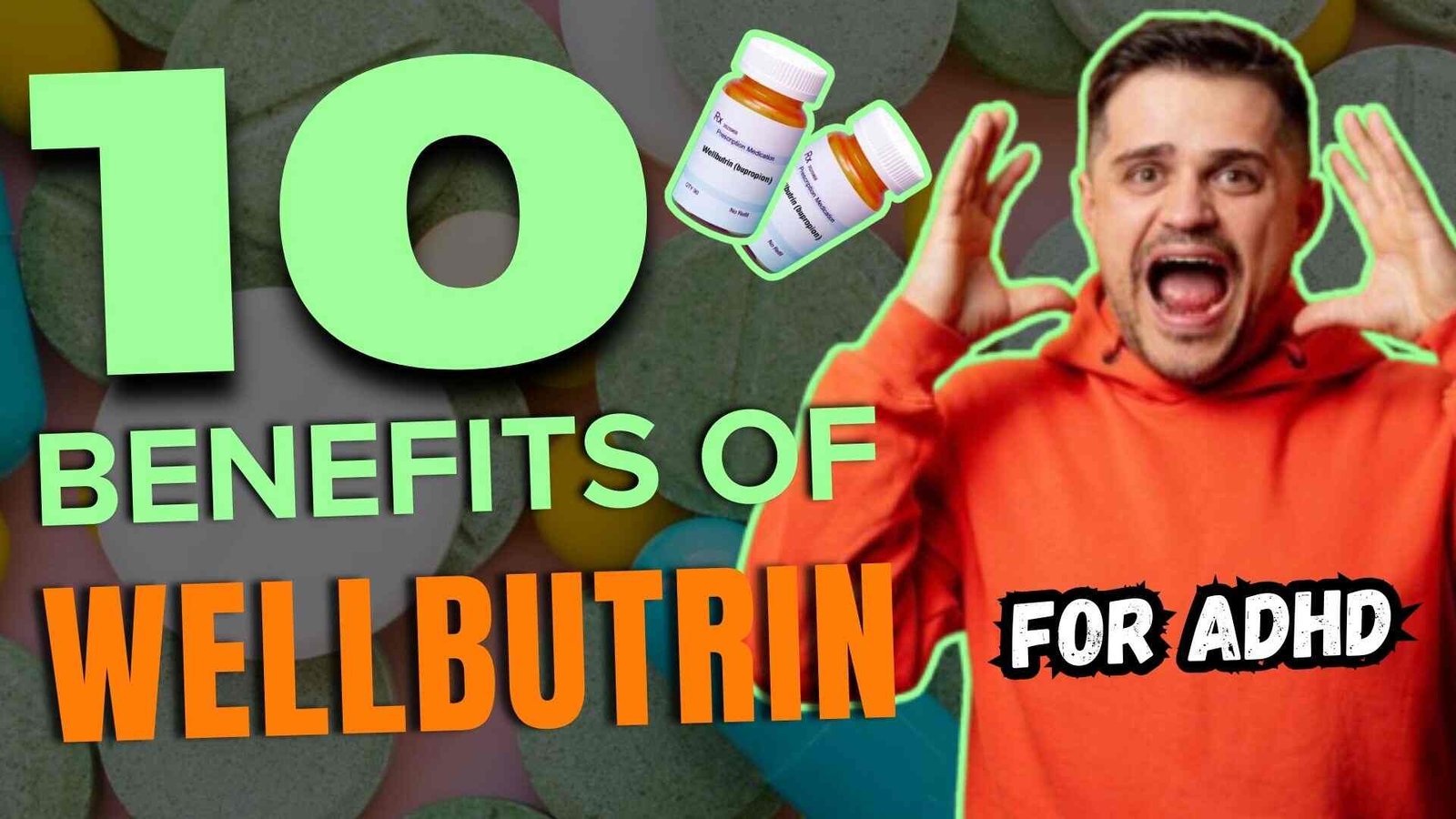Struggling with ADHD and seeking non-stimulant options? Check out Wellbutrin for ADHD—a medication that offers dual benefits for ADHD and depression. Find out how Wellbutrin can enhance focus, boost motivation, and provide comprehensive mental health relief. Learn the top 10 ways Wellbutrin can revolutionize your ADHD treatment in our detailed guide.
Attention Deficit Hyperactivity Disorder (ADHD) is a complex neurodevelopmental condition that affects millions of people worldwide, making it challenging to focus, control impulses, and manage daily life. While stimulant medications are commonly used to manage ADHD, many individuals and healthcare providers are looking into alternative treatments.
One such option is Wellbutrin (bupropion), a medication mainly used for depression and anxiety, but which is also proving to be a helpful option for managing ADHD symptoms. Well, let’s take a closer look at the top 10 revolutionary benefits of Wellbutrin for managing ADHD and enhancing mental health.
Okay, now, without further ado, let’s dig into all the details. Are you pretty much excited to learn more? Alright! Let’s get started!
What is Wellbutrin for ADHD?

When it comes to managing ADHD, finding the right treatment can feel overwhelming. Many people struggle with the side effects of traditional stimulant medications or simply don’t find them effective. Wellbutrin for ADHD has become an increasingly popular option because it offers a different approach. Wellbutrin (bupropion) was initially developed as an antidepressant, but it’s now recognized for its benefits in treating ADHD as well. Unlike stimulants, Wellbutrin for ADHD works by affecting dopamine and norepinephrine levels—neurotransmitters that play key roles in focus, motivation, and mood. This makes Wellbutrin for ADHD a valuable option for those who need an alternative to stimulant medications.
How Wellbutrin Works for ADHD
Wellbutrin for ADHD operates through a unique mechanism compared to traditional stimulant medications. Unlike stimulants, which directly increase dopamine and norepinephrine levels in the brain, Wellbutrin works primarily by inhibiting the reabsorption of norepinephrine and dopamine. This action increases the levels of these neurotransmitters in the brain, which helps improve attention and focus, two key symptoms of ADHD.
The non-stimulant nature of Wellbutrin for ADHD can be advantageous for individuals who experience adverse effects from stimulant medications or those who have additional conditions like depression. By enhancing neurotransmitter activity, Wellbutrin can support cognitive functions and mood regulation, providing a comprehensive approach to managing ADHD symptoms. Understanding how Wellbutrin works can help you appreciate its potential benefits and its role as a treatment option for ADHD.
Why Take Wellbutrin for ADHD?
Choosing to take Wellbutrin for ADHD can be driven by several factors, particularly if you’re looking for a non-stimulant medication. Wellbutrin offers a distinct advantage as it helps manage ADHD symptoms while also addressing symptoms of depression, which is beneficial for individuals who struggle with both conditions. This dual-action effect can lead to overall improvements in both mood and cognitive function, making Wellbutrin a versatile option.
Another reason to consider Wellbutrin for ADHD is its lower risk of dependency and abuse compared to traditional stimulant medications. Since Wellbutrin is not a stimulant, it is less likely to cause issues related to substance misuse. This makes it a safer choice for those who have a history of substance abuse or are concerned about the potential for addiction. By opting for Wellbutrin for ADHD, you can benefit from a medication that provides symptom relief without the added risks associated with stimulants.
10 Benefits of Wellbutrin for Mental Health
Wellbutrin for ADHD offers numerous benefits, making it a valuable option for those dealing with ADHD. Let’s dive deeper into the top 10 benefits of Wellbutrin for ADHD and how they can make a positive impact on your mental health.

1. A Non-Stimulant Alternative
One of the primary reasons people consider Wellbutrin for ADHD is its non-stimulant nature. Traditional stimulant medications, while effective for many, can lead to side effects like restlessness, anxiety, or sleep disturbances. Wellbutrin for ADHD offers a different approach, as it doesn’t cause these common stimulant-related side effects. This makes it a fantastic alternative for those who are sensitive to stimulants or have conditions like anxiety, where stimulant medications might worsen symptoms.
By choosing Wellbutrin for ADHD, you’re opting for a treatment that works by balancing neurotransmitters in the brain rather than overstimulating it. This method reduces the risk of side effects, allowing you to focus on your daily tasks without the distraction of discomfort. For many, this alone makes Wellbutrin for ADHD a preferred option.
2. Dual Benefits for ADHD and Depression
If you’re dealing with both ADHD and depression, Wellbutrin for ADHD can be a game-changer. Many individuals with ADHD also experience symptoms of depression, and finding a treatment that addresses both can simplify your medication regimen and enhance your quality of life. Wellbutrin for ADHD is particularly effective because it was originally developed as an antidepressant, so it addresses both conditions simultaneously.
Taking Wellbutrin for ADHD can lead to improved focus, concentration, and mood stabilization. You may find that your depressive symptoms lessen while your ability to manage ADHD symptoms increases. This dual-action makes Wellbutrin for ADHD an incredibly valuable tool for those struggling with both conditions, helping to simplify treatment and reduce the need for multiple medications.
3. Lower Risk of Dependency
Dependency is a significant concern when it comes to ADHD medications, particularly stimulants. Wellbutrin for ADHD is different because it comes with a much lower risk of dependency. This makes it a safer long-term option for those who require ongoing treatment for their ADHD symptoms. Wellbutrin for ADHD doesn’t produce the same “high” or euphoric feeling that some stimulants can, which contributes to its lower potential for abuse.
By choosing Wellbutrin for ADHD, you’re selecting a treatment option that is effective yet less likely to lead to dependency issues. This can provide peace of mind for both you and your healthcare provider, knowing that the medication is helping without posing a risk of addiction. It’s a responsible choice for long-term ADHD management.
4. Enhanced Focus and Cognitive Function
One of the core symptoms of ADHD is difficulty maintaining focus, and this is where Wellbutrin for ADHD shines. By increasing levels of dopamine and norepinephrine—neurotransmitters critical for attention and cognition—Wellbutrin for ADHD helps improve focus and cognitive function. Many people who take Wellbutrin for ADHD report feeling more mentally sharp and able to complete tasks that previously felt overwhelming.
In everyday life, this means that Wellbutrin for ADHD can help you stay on top of work, school, or personal projects with greater ease. Whether it’s getting through a day of meetings, studying for exams, or simply managing daily responsibilities, Wellbutrin for ADHD supports better focus and mental sharpness, making your days more productive and less stressful.
5. Boost in Motivation
Motivation can be a significant challenge for those with ADHD. If you often feel stuck, and unable to start or finish tasks, Wellbutrin for ADHD may offer the boost you need. This medication enhances the levels of dopamine in your brain, which plays a crucial role in the motivation and reward systems. Wellbutrin for ADHD can help turn that internal “I can’t” into “I can,” giving you the drive to start and complete tasks more efficiently.
For many, the improvement in motivation with Wellbutrin for ADHD translates into better performance at work, school, and even in personal projects. You may find that things that once felt impossible or too daunting to tackle suddenly become manageable. This refreshed sense of motivation can significantly enhance your quality of life.
6. Reduced Impulsivity
Impulsiveness is another characteristic of ADHD, leading to quick decisions, speaking out of turn, or acting without thinking. Wellbutrin for ADHD helps reduce impulsiveness by stabilizing the neurotransmitters that influence self-control and decision-making. With Wellbutrin for ADHD, you’re more likely to pause and think before acting, which can have a positive impact on both your personal and professional life.
This reduction in impulsivity with Wellbutrin for ADHD can improve relationships, as you’re less likely to say or do things you might later regret. It also means that you can approach tasks and challenges with a more measured, thoughtful approach, leading to better outcomes in various areas of your life. Wellbutrin for ADHD helps you regain control over your actions, allowing for more intentional and positive behavior.
7. Improved Mood Regulation
Mood swings are common in those with ADHD, and they can be exhausting for both the individual and those around them. Wellbutrin for ADHD can help stabilize these mood fluctuations, leading to a more balanced and consistent emotional state. This mood regulation is partly due to Wellbutrin ADHD’s antidepressant properties, which help maintain a more even mood throughout the day.
With Wellbutrin for ADHD, you may find that you’re less prone to irritability, frustration, or sudden emotional outbursts. This can improve your relationships and overall sense of well-being, making it easier to navigate daily challenges with a calm and steady mindset. The ability to maintain a more stable mood is one of the significant benefits of Wellbutrin for ADHD for many users.
8. Weight Neutrality
Many medications for ADHD can lead to weight changes, which can be a significant concern for some individuals. However, Wellbutrin for ADHD is generally weight-neutral, meaning it’s less likely to cause significant weight gain or loss. This makes Wellbutrin for ADHD an attractive option for those who want to manage their ADHD symptoms without worrying about their weight.
By choosing Wellbutrin for ADHD, you can focus on improving your mental health without the added stress of weight management issues. This can be particularly beneficial if you’ve struggled with weight fluctuations on other medications. Wellbutrin for ADHD allows you to maintain your physical health while addressing your mental health needs.
9. Better Sleep Patterns
Getting a good night’s sleep is crucial for managing ADHD, yet many ADHD medications can interfere with sleep. Wellbutrin for ADHD, being a non-stimulant, is less likely to cause sleep disturbances, making it easier to maintain healthy sleep patterns. Good sleep is essential for cognitive function, mood regulation, and overall well-being, all of which are important for managing ADHD effectively.
Taking Wellbutrin for ADHD can lead to more restful nights and more alert, focused days. If you’ve struggled with insomnia or disrupted sleep on other ADHD medications, Wellbutrin for ADHD might be a better fit for your lifestyle. The ability to sleep well can significantly enhance the effectiveness of your ADHD treatment.
10. Long-Term Benefits
Consistency is key in managing ADHD, and Wellbutrin for ADHD offers long-term benefits when taken regularly. Over time, many users find that their focus, mood, and overall mental health continue to improve, making Wellbutrin for ADHD a valuable part of a comprehensive ADHD management plan. The long-term benefits of Wellbutrin for ADHD can lead to sustained improvements in your quality of life.
By sticking with Wellbutrin for ADHD as part of your treatment plan, you’re investing in long-term mental health benefits. This includes better management of ADHD symptoms, reduced symptoms of depression, and overall improved functioning in daily life. Wellbutrin for ADHD offers a sustainable approach to ADHD management that can provide lasting positive effects.
Wellbutrin Side Effects

While Wellbutrin for ADHD is generally well-tolerated, it’s important to be aware of potential side effects. Many individuals may experience mild side effects, such as dry mouth, headaches, or nausea. These symptoms are usually temporary and tend to diminish over time as the body adjusts to the medication. However, it’s important to monitor these symptoms and understand that, while common, they can still be bothersome. Adjusting the dosage or timing of Wellbutrin for ADHD may help reduce these issues.
On the other hand, some individuals may encounter more significant side effects when using Wellbutrin for ADHD, such as insomnia, increased anxiety, or elevated blood pressure. These side effects can be more noticeable, particularly at higher doses of the medication. It’s crucial to recognize these potential risks and monitor any changes in your body. Understanding how your body reacts to Wellbutrin for ADHD can help you manage these side effects and determine if this medication is the best option for your ADHD management.
Wellbutrin Interactions

Wellbutrin for ADHD can interact with other medications, making it crucial to be informed about these potential interactions. For example, Wellbutrin can interact with other antidepressants, which might increase the risk of side effects like seizures. This is particularly concerning for individuals who are taking multiple medications to manage different conditions. By understanding the possible interactions, you can take steps to minimize the risk of adverse effects when using Wellbutrin for ADHD.
In addition to interactions with antidepressants, Wellbutrin for ADHD can also interact with medications used for epilepsy, blood pressure, or even common over-the-counter medications like antihistamines. These interactions can affect the effectiveness of Wellbutrin or increase the likelihood of side effects. Therefore, it’s vital to be aware of all medications and supplements you’re currently taking to avoid any harmful interactions. Being attentive and informed about these potential risks can help you use Wellbutrin for ADHD safely and effectively.
Wellbutrin Alternatives

While Wellbutrin for ADHD is effective for many, it’s important to remember that it’s not the only treatment option available. Other non-stimulant medications, such as Strattera or Intuniv, might be more suitable for some individuals. These alternatives offer different mechanisms of action and may be preferred by those who do not respond well to Wellbutrin. Additionally, traditional stimulant medications like Adderall or Ritalin remain popular choices for treating ADHD due to their proven effectiveness in managing symptoms.
For individuals with additional conditions such as anxiety or depression, medications like Lexapro, Zoloft, Pristiq, or Doxepin might be relevant. For managing sleep issues or additional symptoms, options like hydroxyzine or trazodone could be considered. If Wellbutrin for ADHD isn’t the right fit, discussing these alternatives with your healthcare provider can help you explore all available options and find the treatment that best suits your unique needs.
Dosage and Administration

The dosage of Wellbutrin for ADHD varies depending on individual needs and how each person responds to the medication. Typically, treatment begins with a low dose, such as 150 mg once daily, and is gradually increased based on the patient’s response. Starting with a lower dose helps minimize the risk of side effects and allows the body to adjust to the medication. Understanding the correct dosage is essential for achieving the best outcomes when using Wellbutrin for ADHD.
The extended-release form of Wellbutrin for ADHD is often preferred because it provides a steady release of the medication throughout the day. This formulation reduces the need for multiple doses and helps to maintain consistent levels of the drug in the body, which can lead to more stable symptom management. Following the prescribed dosage and administration guidelines is crucial for maximizing the effectiveness of Wellbutrin for ADHD and achieving optimal symptom control.
When and How to Use Wellbutrin

Wellbutrin for ADHD should be taken exactly as prescribed to ensure its effectiveness and safety. It is usually recommended to take Wellbutrin in the morning to prevent potential insomnia, which is a common side effect. Taking the medication with or without food is generally acceptable, but consistency is key. By establishing a routine, you can help maintain stable levels of Wellbutrin for ADHD in your system, which is vital for managing symptoms effectively.
It’s also important not to crush or chew the extended-release tablets of Wellbutrin for ADHD, as doing so can release the drug too quickly into your system. This rapid release can increase the risk of side effects and reduce the medication’s overall effectiveness. Following the prescribed guidelines on how and when to take Wellbutrin for ADHD is essential for ensuring that you get the most benefit from the medication while minimizing potential risks.
Important Considerations

Before starting Wellbutrin for ADHD, there are several important considerations to keep in mind. For instance, if you have a history of seizures or an eating disorder, Wellbutrin may not be the best choice, as it can increase the risk of seizures. Understanding your medical history and how it might interact with Wellbutrin for ADHD is crucial for making an informed decision about whether this medication is right for you.
Additionally, it’s important to monitor your mental health closely, especially in the first few weeks of treatment with Wellbutrin for ADHD. Some individuals may experience increased anxiety or agitation when starting the medication. Being aware of these potential reactions and paying close attention to how your body and mind respond can help you manage any concerns that arise during your treatment with Wellbutrin for ADHD. This awareness is key to ensuring a successful and safe experience with the medication.
Conclusion
Wellbutrin for ADHD offers a non-stimulant alternative that can effectively manage both ADHD symptoms and co-occurring depression. For many individuals, this dual-action benefit makes Wellbutrin an appealing option, especially if they are seeking a treatment that addresses both focus and mood challenges simultaneously. The ability of Wellbutrin to improve focus, motivation, and overall mood can significantly enhance the quality of life for those managing ADHD, providing a pathway to better daily functioning and emotional stability.
However, as with any medication, it’s important to consider potential side effects and interactions with other drugs. Wellbutrin is not without its risks, and individual reactions can vary. Weighing the benefits against any possible drawbacks is essential to determine if Wellbutrin for ADHD is the right fit for your needs. By being aware of how your body responds, you can make informed decisions about your treatment plan.
Final Thoughts
Choosing the right treatment for ADHD can be a complex and personal journey, as each individual’s experience with the disorder is unique. Wellbutrin for ADHD offers a solution that may be particularly beneficial for those who also struggle with depression or who are sensitive to stimulant medications. Its non-stimulant nature allows for an alternative approach to managing ADHD, potentially reducing the risk of some common side effects associated with traditional stimulant treatments.
Tailoring your treatment plan to address your specific symptoms and health considerations can maximize the benefits of Wellbutrin while minimizing any potential risks. With the right support and a carefully considered treatment approach, Wellbutrin for ADHD can be an effective tool in managing your condition and improving your overall mental health.
Engage with Us
Alright, dear visitors,
That’s all from my end. As of now, I’d love to hear from you—share your thoughts and experiences in the comments below. For more mental health-related content and updates, stay in touch with Ultimate Anxiety Guide and keep connected. If you want to connect personally, feel free to email us at ultimateanxietyguide@gmail.com.
Thanks a trillion for your time and effort.
Happy Browsing!
FAQs
